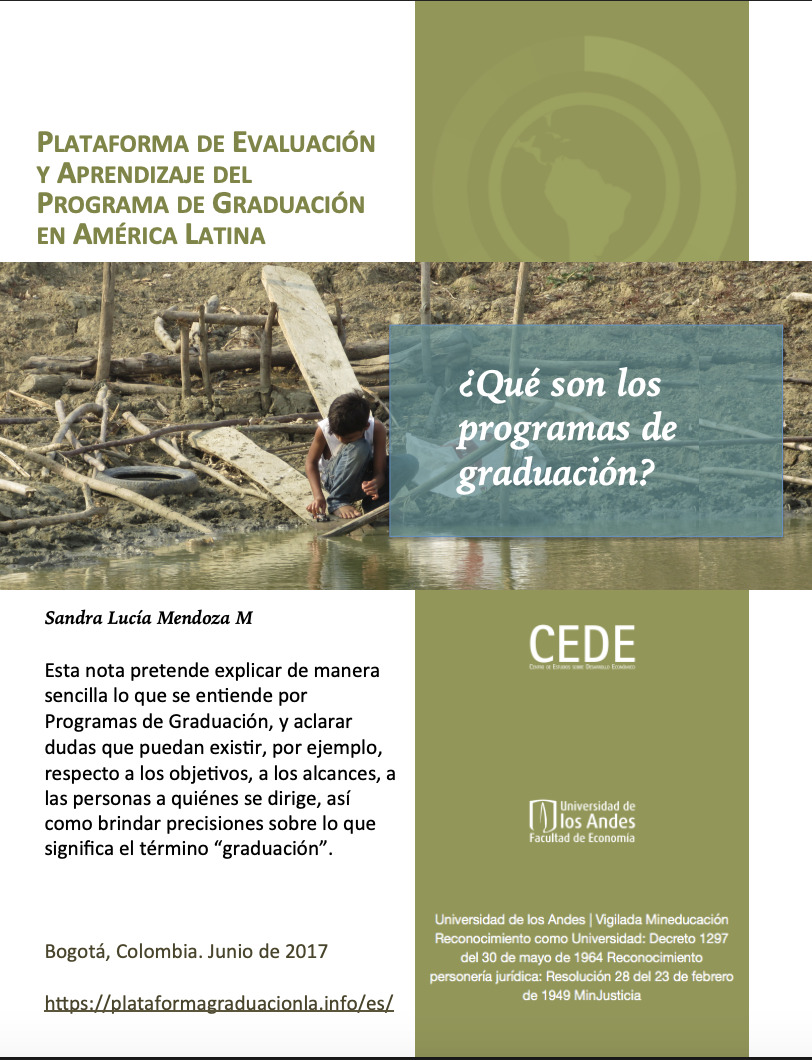The Platform
In 2002, the BRAC Development Institute developed a poverty graduation program in Bangladesh with an innovative and holistic approach called Challenging the Frontiers of Poverty Reduction / Targeting the Ultra Poor (De Montesquiou et al., 2014). Approximately 400,000 people, mostly women heads of households, participated in this program (Fundación Capital and DPS, 2015). Building on this experience, the CGAP (Consultative Group to Assist the Poor) and the Ford Foundation implemented ten pilot graduation programs between 2006 and 2014 in eight countries (Ethiopia, Ghana, Haiti, Honduras, India, Pakistan, Peru, and Yemen), benefiting around 5,000 people, mostly women (Fundación Capital and DPS, 2015).
The Learning and Evaluation Platform for the Graduation Program in Latin America is an initiative to evaluate graduation programs in the region. Currently, various Graduation programs have been or are being implemented by the governments of Colombia, Mexico, Paraguay, and Honduras. The integration of these programs into public policy by governments marks a significant distinction from the first generation of Graduation programs and constitutes the main focus of this research.
The evaluation is conducted by the Faculty of Economics at the University of Los Andes (UNIANDES) through the Center for Economic Development Studies (CEDE), which coordinates the platform in partnership with local implementing partners in the countries or regions where the programs are implemented. The platform is funded by and collaborates with Canada’s International Development Research Centre (IDRC), the Ford Foundation, Fundación Capital—serving as the technical advisor for the evaluated Graduation programs—and the governments of each country.



Implementing
Institutions
The International Development Research Centre is a Canadian government initiative to fund research in developing countries. Established in 1970, it aims to support researchers in these countries with financial resources, advice, and training.
Learn moreThe Learning and Evaluation Platform is led by the CEDE at the Faculty of Economics of the University of Los Andes. CEDE is one of Colombia’s first and foremost centers for economic and social research and consulting. Renowned for the quality and innovation of its research, CEDE boasts a highly qualified team of researchers and educators and is recognized for its impact on public policy issues in Colombia and the region.
Learn moreFundación Capital is an international development organization and innovation lab promoting global economic citizenship. Established in 2009, it aims to create lasting and systemic change. Alongside partners, it designs effective strategies to improve the financial, digital, and economic well-being of communities living in poverty and vulnerability in Latin America and Africa.
Learn moreFor over 80 years, the Ford Foundation has focused on activities that enhance public well-being. Since the 1940s, it has been recognized as one of the largest philanthropic organizations in the world. Guided by a broad purpose of social justice, the Ford Foundation has dedicated its efforts to reducing poverty and injustice, strengthening democratic values, promoting international cooperation, and advancing human achievement.
Learn moreAn autonomous, independent, and innovative higher education institution founded in 1948, promoting pluralism, tolerance, and respect for ideas. The university seeks academic excellence and provides students with critical and ethical training to foster awareness of their social and civic responsibilities, as well as their commitment to their surroundings. It supports research activities that contribute to the country’s development and its international projection.
Learn moreNewsletters

Evaluation and Learning Platform: Methodological Strategies
Evaluating graduation programs implemented in Latin America involves several methodological challenges. This note explains the evaluation strategies developed by the Evaluation and Learning Platform in countries where the graduation program is implemented in the region.
Authors: Viviana León y Jorge Maldonado

What Indicators Are We Evaluating on the Platform?
A critical element of any evaluation exercise is clearly identifying the outcome variables to analyze. This note aims to present the process of selecting the measurement indicators evaluated on the platform.
Authors: Viviana León y Jorge Maldonado

What Are Graduation Programs?
This note seeks to provide a simple explanation of what Graduation Programs are and clarify common questions, such as their objectives, scope, target population, and the meaning of the term “graduation.”
Authors: Sandra Lucía Mendoza M

